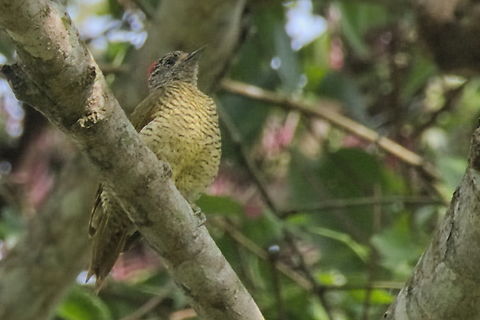
Appearance
The little green woodpecker is about 16 cm long and weighs about 54 g. The male's crown is olive-blackish with an indistinct reddish colour, and the nape is red. The head, neck and throat are buff, with brown spots. The upperparts are yellowish-green or bronze-green. The flight feathers are brown and have buffish bars. The tail is blackish, with some yellow and green. The underparts are buffish from the throat to the breast and greenish-white below the breast, all of the underparts having deep olive bars. The beak is olive or blackish, the eye is brown, and the legs are olive-grey. The female does not have red on the head and has buff spots on its crown and nape. The juvenile bird has greener upperparts with pale streaks, and its underparts are paler.Distribution
The little green woodpecker is found in West Africa, in Senegal, Guinea-Bissau, Guinea, Sierra Leone, Liberia, Ivory Coast and Ghana. Its range would extend east to South Sudan, Uganda, Angola and the Democratic Republic of the Congo if "C. cailliautii permista" were included in this species.Status
Logging and clearing of forests appears to be causing a population increase because the bird prefers open habitats. The species has a large range and increasing population, so the IUCN has assessed it as a least-concern species.Behavior
This woodpecker eats arboreal ants. Its calls are a plaintive "huweeeeh", a harsh "whee", "kewik", three to four "teeay" notes, and "teerweet". It excavates nests in nests of ants and termites. It breeds in August and possibly in March and April.Habitat
Its habitat is edges of primary and secondary forests, clearings, and mosaics of forest and shrub, at elevations up to 1,000 m.References:
Some text fragments are auto parsed from Wikipedia.